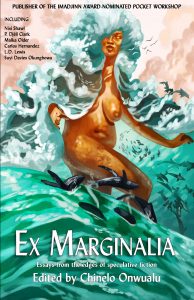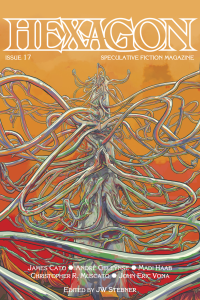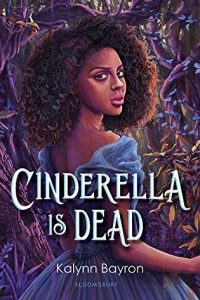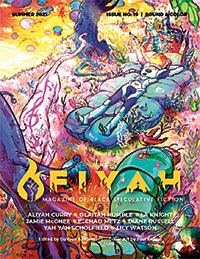Eugen M. Bacon Reviews Ex Marginalia: Essays from the Edges of Speculative Fiction by Chinelo Onwualu, ed.
 Ex Marginalia: Essays from the Edges of Speculative Fiction, Chinelo Onwualu, ed. (Hydra House 978-1-957898-00-1, $19.95, 176pp, tp) June 2023. Cover by Ashe Samuels.
Ex Marginalia: Essays from the Edges of Speculative Fiction, Chinelo Onwualu, ed. (Hydra House 978-1-957898-00-1, $19.95, 176pp, tp) June 2023. Cover by Ashe Samuels.
I could not look away from the startling cover of a naked, big-breasted brown woman with flowing ash hair wading, unseeing, across turquoise waters laden with flying fish. Where does one begin with Ex Marginalia, this powerfully introspective anthology of essays on writing from all manners of margins?
Editor Chinelo Onwualu’s introduction ‘‘Writing Ourselves into Being’’ unpacks what writing from the margin means, and invites the reader to an inner world of writerly fears, doubts and cherishes. Onwualu wonders how it might be to stretch the arms of my imagination and effortlessly find versions of myself at the tips of my fingers. To see myself continuously reflected in every media surface I turned to. If I knew – deeply and fundamentally – that my voice was valuable simply because I’d heard its song in every cadence and set to every beat, what sort of ease would that grant me? What sort of confidence? Would I still have the same bone-deep need for self-expression?
In this yearning to find the self, Onwualu speaks to a default lack of privilege as a queer, dark-skinned black woman, unseen, never reaching ‘‘the dignity of a full character arc.’’
Anyone yearning for an engagement with their difference will recognize these words as uttered by a kindred spirit now seeking liberty in speculative fiction that allows flight, albeit for a moment: ‘‘Whenever reality became too much for me, I could escape into the wilds of outer space, into alternate dimensions and secondary worlds of magic, monsters, and myth where I hoped to find a version of me that I could wholly inhabit.’’
Onwualu’s introduction paves way for the 20 contributors to layer their own art, craft, lived experience, quests and fundamental self-creation in stories that are conversation starters, stories that reflect, in Onwualu’s words, a vast spectrum of pain, joy, grace and growth.
In ‘‘Unqualified’’, Nisi Shawl discloses their personal obstacles to building a writing career, delving in first-person testimony of growing up as a living witness in a country that horrifically persecuted black people, including legally executing a black child as a murderer in South Carolina. Shawl shares the missteps that hinder a writer’s path to success, and how a person of color arrives with fear or discouragement to correct systematic flaws, until they understand to model from pioneers like Samuel R. Delany and Octavia E. Butler. Shawl suggests at the liberty persons of color can draw from speculative fiction: ‘‘The experience of being ‘Othered’ is invaluable for anyone who wants to convey strangeness, cognitive dissonance, and immersion in a nonnative culture.’’
Nigerian Ada Nnadi shares this belief of empowerment through writing speculative fiction that colors their belief, facets their cultural expression and kindles their worldview in enabling ways, accepting their own queerness that started with curiosity.
In ‘‘Small Awakenings’’, Dominique Dickey shares the intensity of a desire to write; it makes them feel alive. Like other authors, Dickey confesses to first writing to fit a normative world of Western fiction, and finally accepting themself, and no longer writing ‘‘to forget the contours of my experience.’’ With this emerged another clarity that ‘‘not every story lands for every reader because not every story is for every reader.’’
Malka Older embodies her writerly, aid-working and sociologist hat, and like Dickey is unworried about alienating the reader (‘‘Not every book is for everyone’’). Older embraces newness, finds comfort in officially not belonging, being outside the square. She’s infatuated with the learning curve of unbelonging, savouring the experience of being visibly and audibly an outsider, because ‘‘being empty’’ means also being ‘‘ready to absorb.’’ It means swinging open the floodgates of curiosity in food, language, culture, and the non-other ‘‘other.’’
Likewise, Chinese Canadian Millie Ho appreciates the benefits of exposing herself to something new but first wrote from a white, male lens – until she discovered writers like Catherynne M. Valente and Octavia Butler. She was finally able to snatch her own sense of self, open herself to an intrinsic cultural experience and this led to a personal visit to Chongqinq in Southwest China to rediscover her roots.
In ‘‘What Should Not Be Broken’’, Nelly Geraldine García-Rosas – having spoken in broken language as a migrant – now speaks of the fragility that society imposes on marginalized writers who can’t help but feel that everything is ‘‘only broken for you, and because of you.’’ But in speculative fiction came the realization that language is no more broken, that there are brand new worlds to play with. With it also came the realisation, as Suyi Davies Okungbowa shares, that there was no more need to write in double exposition, in double consciousness to explain your text for the normative reader, editor, publisher. All you needed was a litmus test for accessibility: are the doors open to allow others in?
While most contributors preface their experiences as persons of color, other margins demand heeding, such as the trials of skirting around chronic illness (sometimes arising from long COVID), as in Julia Rios’s ‘‘How Will You Use Your Voice’’ and L.D. Lewis’s ‘‘Minding the Gap: On Navigating Reality through Speculative Fiction’’.
Ibtisam Azem tells about the cathartic nature of speculative fiction in writing about the homeland, Palestine, and applies magical realism to show what happens when the news stops. Azem uses fiction to pull the lives of those who disappeared, those who are outside the frame, back centerstage. Some essays are assertive, as in Ayọdélé Ọlọfintúádé’s ‘‘Oja Oyingbo: Centering the Fringes’’: ‘‘I don’t need anyone to make me a seat. I came with my own table.’’
Ọlọfintúádé reiterates the African tradition of storytelling, jollity, and wisdom in tales of the cunning tortoise. They draw their writerly inspiration from Ifa philosophies, arts, sciences, mathematics, poetry, metaphysics, and medicine – embedded in their first language, Yoruba. They situate their text in the context of ‘‘a queer, Indigenous Yoruba, black, feminist, they/them who is vocal about racism, imperialism, and world politics,’’ and add levity to their bio: ‘‘famous for being genius at creating chaos by merely existing.’’
Similarly, other essays are less intense and more tongue-in-cheek, as in Shawn Frazier’s ‘‘A Writer’s Lament in Seven Stages’’ and Carlos Hernandez’s humorous ‘‘Two Truths Means No Truths’’ – a professor of English’s enthused interrogation of language, having grown up bilingual in Spanish and English. Others essays are balanced in somberness and levity, as in Chịkọdịlị Emelụmadụ’s ‘‘Messy: A Letter to my Editor’’ – a superbly crafted unravelling with a primal plea: ‘‘You have to be okay with being the only person who believes in you.’’
P. Djèlí Clark nudges writers to ‘‘keep putting your stuff out there – because you never know who’s looking’’.
Ex Marginalia contains personal truths, voices from the margins revealing their innermost selves, and those seeking to mend in their own ways (and in García-Rosas’s words) that which should not in the first place be broken. Ex Marginalia is a critically rewarding, introspective selection of essays that will conflict, startle, and reassure you. It’s an anthology that singularly and collectively speaks directly and solemnly to you.
Eugen M. Bacon, MA, MSc, PhD, is African Australian, a computer graduate mentally re-engineered into creative writing. She studied at Maritime Campus, less than two minutes’ walk from The Royal Observatory of the Greenwich Meridian. She’s a 2022 World Fantasy Award finalist, and was announced in the honor list of the 2022 Otherwise Fellowships for ‘doing exciting work in gender and speculative fiction’. Her book Danged Black Thing made the 2021 Otherwise Honor List as ‘a sharp collection of Afro-Surrealist work’. Eugen has won or been commended in international awards, including the Foreword Indies Awards, BSFA Awards, Bridport Prize, Copyright Agency Prize, Horror Writers Association Diversity Grant, Otherwise, Rhysling, Elgin, Aurealis, Australian Shadows, Ditmar and Nommo Awards for Speculative Fiction by Africans. Eugen’s creative work has appeared in literary and speculative fiction publications worldwide, including Award Winning Australian Writing, Fantasy Magazine, Fantasy & Science Fiction, and Year’s Best African Speculative Fiction. New releases: Mage of Fools (novel), Chasing Whispers (collection), An Earnest Blackness (essay collection).
This review and more like it in the June 2023 issue of Locus.
 While you are here, please take a moment to support Locus with a one-time or recurring donation. We rely on reader donations to keep the magazine and site going, and would like to keep the site paywall free, but WE NEED YOUR FINANCIAL SUPPORT to continue quality coverage of the science fiction and fantasy field.
While you are here, please take a moment to support Locus with a one-time or recurring donation. We rely on reader donations to keep the magazine and site going, and would like to keep the site paywall free, but WE NEED YOUR FINANCIAL SUPPORT to continue quality coverage of the science fiction and fantasy field.
©Locus Magazine. Copyrighted material may not be republished without permission of LSFF.







